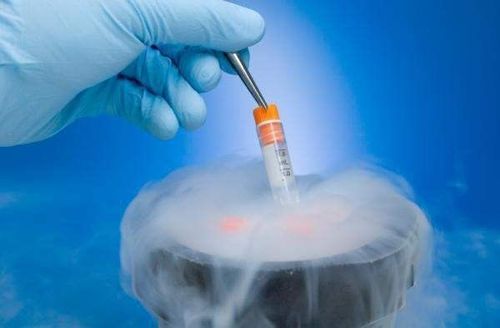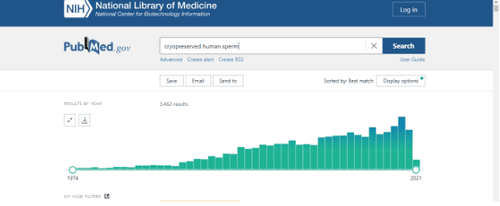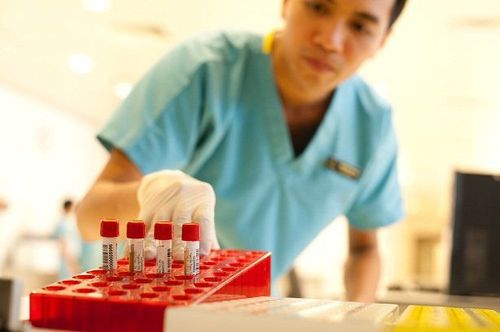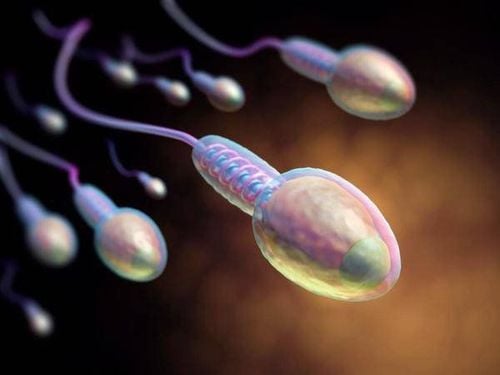This is an automatically translated article.
The article is written by Dr., Doctor Tuong Thi Van Thuy - Vinmec High-Tech Center.
The deep cryopreservation of sperm today is no longer strange, but has become quite popular as technology in the field of assisted reproduction is increasingly developed. The sperm freezing process is not too complicated or requires many modern equipment technology.
Sperm, after being actively or passively expelled from the male genitalia, will be evaluated for quality and quantity. Immediately after that, the sperm will be added with a corresponding amount of preservative, cooled by cycle, and put into a deep cryopreservation system. The sperm storage system uses liquid nitrogen to ensure a constant deep cryogenic temperature between -196°C. At this temperature, cells in general and sperm in particular are said to maintain their viability almost indefinitely since all metabolic activities/reactions are absent. That is theoretical, but in clinical practice how storage and use of frozen sperm has been done and evaluated.
1. How is sperm freezing performed?
For many different reasons, when men have a need to store sperm for personal purposes or donate to the community, they all need to be screened. Screening varies according to each receiving unit, each territory, but in general, it is necessary to screen for infectious diseases (HIV, syphilis, hepatitis B or C virus, ...); hereditary pathology; mental illness.
Once men pass the screening, they will be asked to ejaculate by masturbation to collect a sperm sample. In some cases, the man is unable to actively ejaculate, which will require some special intervention to collect sperm. Immediately after the sperm is removed from the man's body, the sperm should be assessed quickly in terms of quantity and quality (morphology, motility, properties, pH, ...). In the next step, the sperm sample is added with a preservative, and programmed to cool. The cooling process helps to protect sperm, minimizing the negative impact of deep cooling on sperm viability. After the sperm is successfully cooled, the sperm will be placed into a storage system using liquid nitrogen. Sperm will be maintained in liquid nitrogen until it is indicated to be removed for treatment.

Trữ đông tinh trùng giúp bảo quản chất lượng cũng như thời gian sử dụng tinh trùng
2. Who can perform sperm cryopreservation?
The use of frozen sperm has become popular all over the world, applied in all countries on all continents.
Since the 70s of the last century, frozen sperm has been performed first for cancer patients (including testicular cancer and other primary cancers), followed by Infertile couples need the intervention of reproductive assistance, men are at high risk (mumps, dangerous environment...). And to this day, sperm freezing is considered fertility insurance for any man who wants and meets the requirements of the screening.
3. Does frozen sperm have an expiration date?
As mentioned above, when sperm is stored in a preservative-free environment and the temperature is stabilized at -196°C, there is theoretically “no” shelf life. An increasing number of studies have been reported on deep cryopreserved human sperm (Figure 1) from 1974 to present. Clinical practice has documented successful pregnancies with frozen sperm for more than two decades, in some cases up to four decades.

Hình 1: Các báo cáo trên thế giới về việc sử dụng tinh trùng đông lạnh của nam giới từ 1974 - 2021
First, in June 2004, the popular magazine "Human Reproduction" published a report from the Center for Assisted Reproductive Medicine, Mary's Hospital in Manchester, UK about a baby successfully born in March. same year by ISCI method (sperm direct injection into the cytoplasm of the ovum) from sperm frozen for 21 years. Notably, this is the sperm that was frozen before treatment of the man diagnosed with cancer. And this is the longest successful use of frozen sperm samples recorded at that time (1).
Next, in March 2001, a man's semen, which had been stored since 1972 prior to a vasectomy, was thawed and given an IUI (intrauterine insemination). at the Mid-Atlantic Assisted Reproductive Center in Bethesda, Marylandy, New York, USA. In January 2002, a healthy baby boy was born. This sperm sample used to successfully conceive was frozen for 28 years, 11 months. Previously, they reported using this same frozen sperm sample at 21 years and 11 months to successfully conceive using IUI (2).
3rd clinical case reported in the United States. Between January and December 1971, the 52-year-old man submitted a request to freeze his sperm sample for long-term storage purposes. The man then donated his semen sample to the Altas Bates IVF program from 2009 to 2011 to help women who wanted to ask for sperm. In October 2011, a 25-year-old woman asked for this sperm sample for insemination. Previously, she had been advised by a doctor about the risks of using a nearly 40-year-old frozen sperm sample from a man over 40 years old. There were 9 embryos successfully generated after performing ISCI. And a result could not be more amazing, two healthy girls were born at 38 weeks gestation with a weight of 2,693 and 2,948g. Two babies are reported to be developing normally to date (3).
The above reports and many others regarding the use of frozen sperm have provided evidence over time that the viability of frozen semen can be maintained for at least several decades century. This is also consistent with the hypothesis that stored frozen cells show little or no damage during prolonged storage in liquid nitrogen.
Moreover, the clinical results also help men who depend on using frozen semen to have children to get rid of the worry about whether their sperm viability will be preserved for a long time. long term storage or not; because their storage requirements hardly exceed 4 decades.
Vinmec Tissue Bank has been licensed by the Ministry of Health in sperm preservation activities (https://www.vinmec.com/vi/ngan-hang-mo-vinmec/) ready to receive all needs of male clients related to deep cryopreservation of sperm. More specifically, Vinmec Tissue Bank has a close cooperation with Vinmec Times City Fertility Center, creating favorable conditions and ensuring the highest quality for customers performing both sperm storage services as well as sperm storage services. such as defrosting sperm to perform Assisted Reproductive Techniques.
Customers wishing to use the service should contact Vinmec Tissue Bank via:
Hotline: 0936 246 199
Email: v.biobank@vinmec.com
Direct contact at Vinmec Times City International General Hospital , 458 Minh Khai, Hai Ba District
Trung, Hanoi.
Please dial HOTLINE for more information or register for an appointment HERE. Download MyVinmec app to make appointments faster and to manage your bookings easily.
Reference(1). Horne G, Atkinson AD, Pease EH, Logue JP, Brison DR, Lieberman BA. Live birth with sperm cryopreserved for 21 years prior to cancer treatment: case report. Hum Reprod. 2004;19:1488–9.
(2). Feldschuh J, Brassel J, Durso N, Levine A. Successful sperm storage for 28 years. FertilSteril. 2005;84:1017.e3–4.
(3). Andras Z. Szell, Russell C. Bierbaum, W. Brent Hazelrigg, Ryszard J. Chetkowski. Live births from frozen human semen stored for 40 years. J Assist Reprod Genet (2013) 30:743–744













